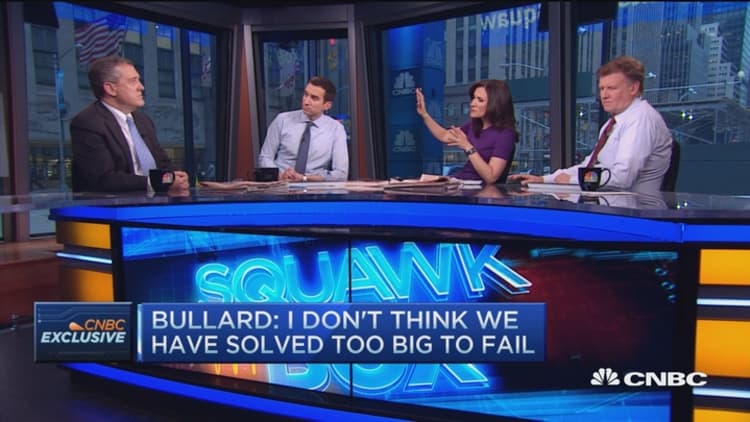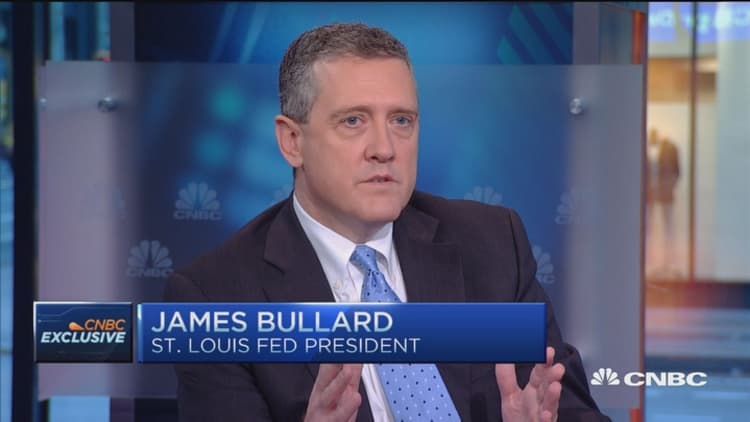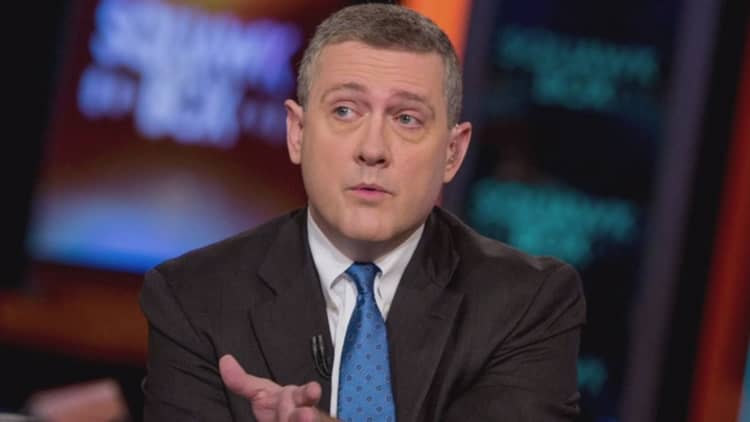







The nation's megabanks need to be split up like the old AT&T monopoly in order to foster innovation in the new digital age at the intersection of financial services and information technology, St. Louis Fed President Jim Bullard said Thursday.
"You broke that thing up and what did you get? You got all the phones we're talking about this morning," said Bullard, arguing the environment created by the 1984 dismantling of AT&T gave rise to the cellphone revolution.
The banking industry could experience the same type of transformative moment if the big financial institutions were broken up, he told CNBC's "Squawk Box," as part of a wide-ranging interview.
"You have more firms. You take off some of the regulation. You let them do whatever the heck they want. You get more innovation," he said.
The tighter banking regulations after the financial crisis have not solved the "too big to fail" problem, said Bullard, a longtime advocate of smaller banks and a voting member this year on the Federal Reserve's policymaking committee. But he admitted banks are safer today than they were in 2007 and 2008.
He said, "We had to implement Dodd-Frank," referring to the financial reform law that in part requires large banks to hold more just-in-case capital, so American taxpayers would not be on the hook to bail them out if there were another global shock.
"You [still] have very big firms that are unlikely to innovate into the future," Bullard said. "We're writing all these laws, all these detailed things, about exactly what they are doing today without much thought about what they're going to do tomorrow."
Bullard's position echos what Minneapolis Fed President Neel Kashkari, the newest central bank policymaker, told "Squawk Box" last week. Pointing to the role smaller banks can play in the system, Kashkari said that the big institutions are still "too big to fail" and that he's going to work with experts to help craft by the end of the year a plan to address the problem "once and for all."
Pointing to the smaller banks, Kashkari said they are still "too big to fail" and that he's going to work with experts to help craft by the end of the year a plan to address the problem "once and for all."
In a speech the day before appearing on CNBC, Kashkari urged Congress to consider bold rules, including breaking up the largest banks or turning the institutions into "utilities" by creating huge cash cushions so they can't fail. Such rules would go further than the post-crisis Dodd-Frank regulations.
In the meantime, "the Financial Stability Oversight Committee, they're naming particular firms as being 'too big to fail.' In some ways, that's ensconcing the status of these firms as if it's going to be the same companies for the next 50 years or 100 years," Bullard said.
Companies with a designation of "too big to fail," or more formally referred to as a "systemically important financial institution," are required, among other things, to hold more capital.
Bullard said Kashkari has the right idea. "You've got to think more deeply about this longer term. Whatever you think about Dodd-Frank, it's about how you're going to get the innovation." Bullard cited cutting-edge ideas surrounding virtual currencies like bitcoin and peer-to-peer lending as examples.
Regulators, policymakers and legislators need to foster an environment so these kinds of advancements start in the United States, Bullard said, giving U.S. banks a further leg up on the "bureaucratic nightmares" in China and their closely tied to government counterparts in Europe.







